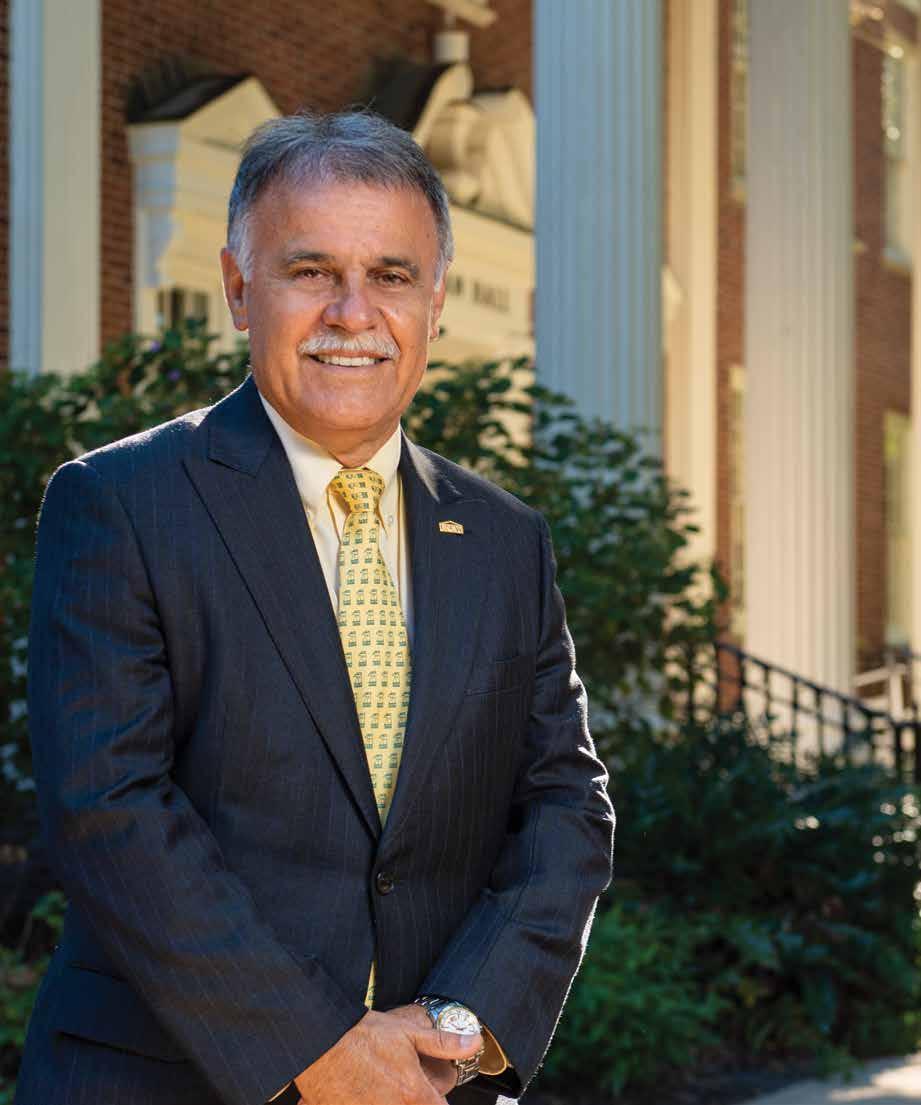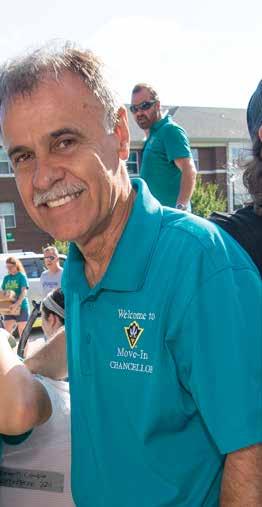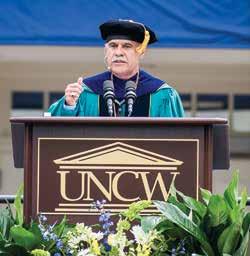
8 minute read
EMBRACING THE WORLD
– Albert Einstein
Advertisement
Imagination and success have fueled Chancellor Sartarelli’s tenure
By Krissy Vick
University of North Carolina Wilmington Chancellor Jose V. Sartarelli has never lacked imagination. In fact, Albert Einstein’s words have been a guiding principle for him throughout his career in higher education and global business.
Dr. Sartarelli will officially retire this summer, effective June 30, 2022, after leading the state’s coastal university for nearly seven years and accomplishing even more than he could have imagined.
“Imagination, passion, interpersonal skills, empathy and hard work are all necessary for success,” said Dr. Sartarelli. “At UNCW, we have been able to do things no one believed possible.” He is especially proud of UNCW becoming a doctoral university and growing the engineering program, two ideas that he dreamed would come to fruition.
“Chancellor Sartarelli has taken UNC Wilmington to new heights, leading with ambition all while handling serious challenges posed by hurricanes and the pandemic,” said UNC System President Peter Hans. “UNCW has increased its student population by nearly 40 percent in the past decade under the chancellor’s direction, providing quality educational opportunities to more North Carolinians and expanding campus facilities to meet that growth. I’m so grateful for his steady and visionary leadership, and I know all Seahawks join me in thanking him for his service to UNCW and the state.” UNCW cultivated $767 million in funding through various channels under Chancellor Sartarelli’s leadership. The university also set records for annual enrollment and graduation; publicly launched Like No Other: The Campaign for UNCW, which exceeded its original alumni giving goal and is expected to surpass its $100 million goal; increased community, military and international partnerships; enhanced on-campus and online educational offerings; and achieved a new research designation. For the past three years, UNCW has been one of only three UNC System institutions ranked among the “Top 100 Public National Universities,” according to U.S. News & World Report.




The university community has also worked together to overcome significant challenges in the aftermath of Hurricanes Florence and Dorian; to navigate the campus impacts of the COVID-19 pandemic; and to focus more fully on issues of diversity, equity and inclusion. Meanwhile, UNCW allocated approximately $615 million in construction projects, adding 23 new buildings – including one of Chancellor Sartarelli’s favorite places on campus, the Veterans Hall complex – and numerous renovation and modernization projects. “The success that our students, faculty, staff and alumni have achieved in recent years has been nothing short of outstanding,” Chancellor Sartarelli said. “I am immensely proud to have served UNCW during such a pivotal time in history, and I thank the Seahawk community for making this great university so special.”
UNCW Board of Trustees Chair Gidget Kidd ’91 has worked with Dr. Sartarelli from the outset of his tenure at UNCW.
“Chancellor Sartarelli thrives on turning challenges into opportunities,” she said. “The chancellor has inspired the UNCW community to pursue excellence at every level, and the Board of Trustees is very grateful for his service.” The Sartarellis plan to retire in Naples, Florida, pursuing their hobbies of reading, learning Italian and going to the movies. They also plan to travel to Sicily and take a Viking cruise in Europe.
“I have always felt that education changes lives, and that was an incentive for me to pursue higher education,” said Dr. Sartarelli. His own success is rooted in life-changing opportunities provided through education, scholarship and important relationships.
The youngest of six siblings, Dr. Sartarelli grew up on a family farm in a rural town in Brazil, population 10,000. He attended a farm school, which closed halfway through his second-grade year. When he was 10 years old, his family earned enough from a prolific tomato crop to move to São Paulo, population 10 million, where he resumed his education. Tomatoes will always be his favorite food, he says, because of the opportunities they created for his family.
Sartarelli learned about the American Field Service program, a study abroad program for high school students that still exists today. Having an impeccable academic record, he applied and was accepted. In 1967, Dr. Sartarelli, equipped with a tremendous amount of courage but barely any English, traveled a full day by car and train to arrive in Rio, where he boarded a flight to the United States.




Dr. Sartarelli spent the next decade expanding his education. After studying abroad in Dimmitt, Texas, and traveling the U.S. by bus with fellow students, he returned to Brazil for college, where he considered majoring in engineering but chose business instead. He worked parttime as an English tutor in the evenings so he could be a full-time student at the São Paulo School of Business Administration (Fundação Getulio Vargas). Fortuitously, one of the students he tutored for several years recognizedhis potential and helped with his housing and tuition expenses.
After graduating at the top of his class with a Bachelor of Business Administration in Marketing in 1973, Dr. Sartarelli returned to the states as a Fulbright Scholar and attended Michigan State, earning a Master of Business in Marketing and a doctoral degree in business administration. He also met his wife, Kathy, who earned her master's degree in biophysics.
As he contemplated his career path, Dr. Sartarelli recalls sending 143 resumes to both businesses and universities. Weighing his interests in academia and business, he decided to postpone pursuing his path in higher education. Dr. Sartarelli spent the next 30 years in global marketing and management senior leadership, working for three pharmaceutical giants: Eli Lilly and Co., Bristol-Myers Squibb Co. and Johnson & Johnson.
Accomplishments Chancellor Jose V. Sartarelli’s
• UNCW’s growth of enrollment resulted in the largest amount of support for enrollment growth in the UNC System – $74 million over a six-year period. • Focused on retention and graduation culminated with the largestever class of graduates in 2020-21: 5,117 students. Since 2015-16, the number of graduates totals about 27,000 students, about a third of all living alumni of the university. • Received approval for 20 new programs including undergraduate degrees in coastal engineering (the first of its kind in the nation), respiratory therapy, cybersecurity and intelligent systems engineering. • Provided strategic leadership during the aftermath of Hurricane
Florence, which caused $134 million in damage to UNCW. • Helped guide the campus through the worst global pandemic in a century, state-mandated closures in spring/summer 2020. • Significantly strengthened the university’s relationships with international institutions, moving from 52 partnerships six years ago to 119 in 2021. • Oversaw expansion of the university’s physical campus.
Over the past few years, UNCW has undertaken approximately $615 million in campus construction. • Collaborated with students, faculty, staff and alumni to focus more fully on issues of diversity, equity and inclusion. UNCW has committed to invest nearly $1.5 million annually for five years to increase representation of underrepresented populations at the university. • Publicly launched Like No Other: The Campaign for UNCW in
February 2021. Thanks to the generosity of thousands of alumni, students, employees and donors, the university is expected to surpass its goal to raise at least $100 million in philanthropic support for students, facilities, faculty, programs and other university priorities. • Secured the largest private philanthropic gifts in UNCW history – a $10 million gift from David Congdon ’78, and his wife, Helen, and a $5 million corporate gift from Quality Chemical Laboratories, and its founder Dr. Yousry Sayed and his wife Linda, ’78, ’85M.

At the urging of a close mentor and friend, in 2010, Dr. Sartarelli revisited his interests in higher ed and returned to academia to become the Milan Puskar Dean of the College of Business and Economics at West Virginia University. Under his leadership, the business college improved its academic profile, set enrollment and fundraising records, partnered with other campus units to create six joint degree programs, established three new centers and launched both a Ph.D. in business administration and a fully online executive MBA.
Dr. Sartarelli leveraged his international experience as the chief global officer for WVU, focusing on international recruiting efforts and achieving doubledigit growth in international undergraduate applications. With his guidance, WVU forged new partnerships and signed numerous student exchange agreements. Within five years, Dr. Sartarelli’s ambition to lead a university led him from the Appalachian Mountains of West Virginia to the crystal coast of North Carolina.
Drawing from his previous experiences, his “fire in the belly” passion and his ever-present imagination, Dr. Sartarelli became the sixth chancellor and ninth leader of UNCW on July 1, 2015. As he reflects on retirement, Dr. Sartarelli feels grateful and satisfied that UNCW is well-positioned for his successor.

“From the very beginning, I wanted to make this university bigger and better We made it bigger, made it better,” said Dr. Sartarelli. “Thanks to my predecessors, UNCW already was a strong university when I arrived. I have had the privilege of working alongside dedicated Boards of Trustees, my leadership team, faculty, staff, students and countless alumni, donors and community partners to open new doors of opportunity for the university, the region and North Carolina. I have no doubt that the university’s trajectory of success will continue to soar far into the future.”










